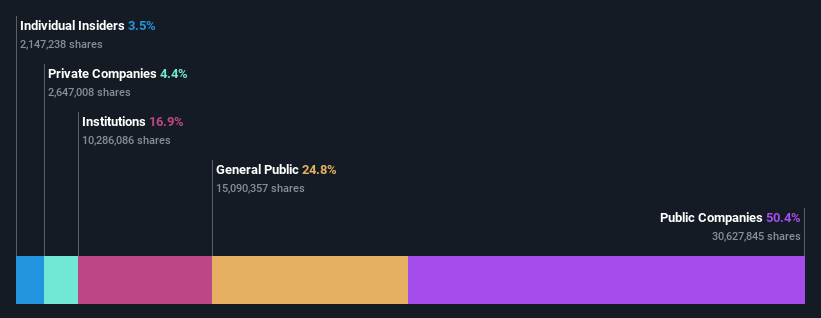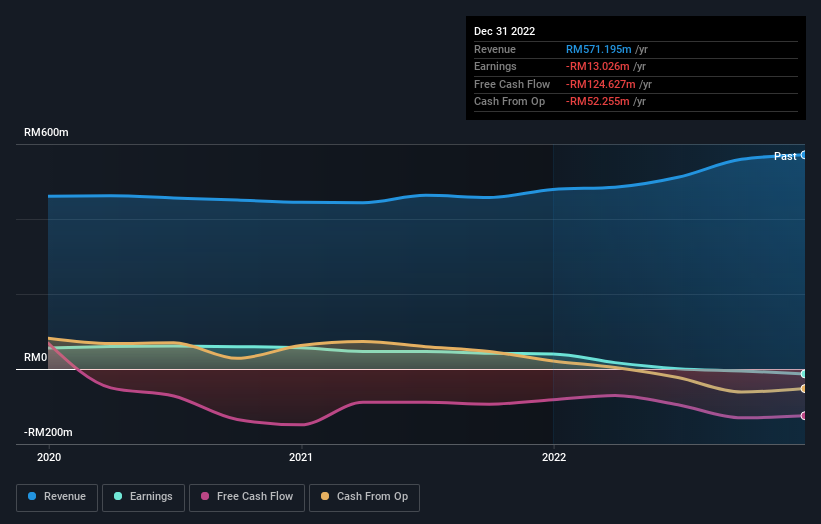Public companies account for 50% of Ajinomoto (Malaysia) Berhad's (KLSE:AJI) ownership, while individual investors account for 25%
Key Insights
The considerable ownership by public companies in Ajinomoto (Malaysia) Berhad indicates that they collectively have a greater say in management and business strategy
50% of the company is held by a single shareholder (Ajinomoto Co., Inc.)
Every investor in Ajinomoto (Malaysia) Berhad (KLSE:AJI) should be aware of the most powerful shareholder groups. And the group that holds the biggest piece of the pie are public companies with 50% ownership. In other words, the group stands to gain the most (or lose the most) from their investment into the company.
And individual investors on the other hand have a 25% ownership in the company.
In the chart below, we zoom in on the different ownership groups of Ajinomoto (Malaysia) Berhad.
View our latest analysis for Ajinomoto (Malaysia) Berhad
What Does The Institutional Ownership Tell Us About Ajinomoto (Malaysia) Berhad?
Institutional investors commonly compare their own returns to the returns of a commonly followed index. So they generally do consider buying larger companies that are included in the relevant benchmark index.
Ajinomoto (Malaysia) Berhad already has institutions on the share registry. Indeed, they own a respectable stake in the company. This suggests some credibility amongst professional investors. But we can't rely on that fact alone since institutions make bad investments sometimes, just like everyone does. If multiple institutions change their view on a stock at the same time, you could see the share price drop fast. It's therefore worth looking at Ajinomoto (Malaysia) Berhad's earnings history below. Of course, the future is what really matters.
Hedge funds don't have many shares in Ajinomoto (Malaysia) Berhad. Ajinomoto Co., Inc. is currently the company's largest shareholder with 50% of shares outstanding. This essentially means that they have extensive influence, if not outright control, over the future of the corporation. In comparison, the second and third largest shareholders hold about 3.8% and 2.3% of the stock.
While it makes sense to study institutional ownership data for a company, it also makes sense to study analyst sentiments to know which way the wind is blowing. We're not picking up on any analyst coverage of the stock at the moment, so the company is unlikely to be widely held.
Insider Ownership Of Ajinomoto (Malaysia) Berhad
The definition of company insiders can be subjective and does vary between jurisdictions. Our data reflects individual insiders, capturing board members at the very least. Company management run the business, but the CEO will answer to the board, even if he or she is a member of it.
Most consider insider ownership a positive because it can indicate the board is well aligned with other shareholders. However, on some occasions too much power is concentrated within this group.
Shareholders would probably be interested to learn that insiders own shares in Ajinomoto (Malaysia) Berhad. In their own names, insiders own RM30m worth of stock in the RM839m company. Some would say this shows alignment of interests between shareholders and the board, though we generally prefer to see bigger insider holdings. But it might be worth checking if those insiders have been selling.
General Public Ownership
With a 25% ownership, the general public, mostly comprising of individual investors, have some degree of sway over Ajinomoto (Malaysia) Berhad. While this group can't necessarily call the shots, it can certainly have a real influence on how the company is run.
Private Company Ownership
Our data indicates that Private Companies hold 4.4%, of the company's shares. Private companies may be related parties. Sometimes insiders have an interest in a public company through a holding in a private company, rather than in their own capacity as an individual. While it's hard to draw any broad stroke conclusions, it is worth noting as an area for further research.
Public Company Ownership
It appears to us that public companies own 50% of Ajinomoto (Malaysia) Berhad. We can't be certain but it is quite possible this is a strategic stake. The businesses may be similar, or work together.
Next Steps:
I find it very interesting to look at who exactly owns a company. But to truly gain insight, we need to consider other information, too. Take risks for example - Ajinomoto (Malaysia) Berhad has 1 warning sign we think you should be aware of.
If you would prefer check out another company -- one with potentially superior financials -- then do not miss this free list of interesting companies, backed by strong financial data.
NB: Figures in this article are calculated using data from the last twelve months, which refer to the 12-month period ending on the last date of the month the financial statement is dated. This may not be consistent with full year annual report figures.
Have feedback on this article? Concerned about the content? Get in touch with us directly. Alternatively, email editorial-team (at) simplywallst.com.
This article by Simply Wall St is general in nature. We provide commentary based on historical data and analyst forecasts only using an unbiased methodology and our articles are not intended to be financial advice. It does not constitute a recommendation to buy or sell any stock, and does not take account of your objectives, or your financial situation. We aim to bring you long-term focused analysis driven by fundamental data. Note that our analysis may not factor in the latest price-sensitive company announcements or qualitative material. Simply Wall St has no position in any stocks mentioned.
Join A Paid User Research Session
You’ll receive a US$30 Amazon Gift card for 1 hour of your time while helping us build better investing tools for the individual investors like yourself. Sign up here

 Yahoo Finance
Yahoo Finance 

